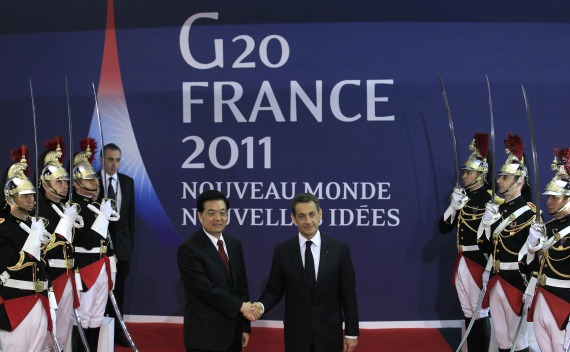China Games the G20, but to What End?
More on:

One of the big stories playing out at the G20 in Cannes is “will it or won’t it?” Namely, will China meet the European request to help bailout the euro to the tune of $140 billion or will it take a pass? While China holds out on its answer—either for maximal political advantage or because it really isn’t sure what it wants to do—the drama is mounting.
Analysts and the media are consumed with the prospect of what China will ask for in return—if it decides to help. Will China be able to parlay its economic support into some political concessions? Some observers have suggested that European leaders will back down on visits with the Dalai Lama—always a sticking point with the Chinese—or not pressing the Chinese on human rights. An editorial in China’s nationalist Global Times argues that, in return for China’s cash, the EU should further open their markets to China and finally admit that it is a market economy. Maybe it will be as straightforward as the G20 not issuing a joint leader statement singling out China as needing more flexibility in its currency to help ease global trade and investment balances, as a draft statement indicated. While the latter might be a feasible trade-off, a simple look at the realities of democratic politics in Europe provides the answer to the issue of a broader quid pro quo. Democracies cannot control the voices of their elected officials or people. They are also premised on a certain set of political understandings that make it difficult, although not always impossible, to turn a blind eye to human rights abuses. The fact that China already holds significant reserves in euros and is the largest foreign holder of U.S. debt has not prevented either the United States or countries in Europe from trying to hold China to account for trade infractions or political concerns.
In fact, Beijing is likely well-aware that it will not be able to exact a political price for an economic choice, although it may still try. The decision will be overwhelmingly an issue of economics. As Leo Cendrowicz points out in Time, China already has as much as one quarter of its currency reserves in euros, it has a vested interest in keeping its largest trading partner trading, and a weaker euro spells trouble for Chinese exports. At the same time, riding to the rescue of Europe at the 11th hour will give China’s global image a much-needed boost, given the recent flare-ups of anti-China sentiment throughout much of Asia and in a number of developing countries. It seems likely that Beijing will find a way to help out—either by shifting around some of its reserves or working through the International Monetary Fund. Yet there appears little real enthusiasm at the prospect in Beijing to step up to the plate in a significant way. As President Hu noted, “It is mainly up to Europe to resolve the European debt problem…We believe that Europe has all the wisdom and capability to resolve the debt problem.”
China’s foreign policy is in the midst of a broader transition and its participation in the G20 and euro bailout provide only two small data points in trying to understand where China is headed. Wang Yong, director of Peking University’s Center for International Political Economy, gave some indication of China’s long-term game plan in his recent article, “China in the G20: a balancer and a responsible contributor.” Wang said that while China is not ready to take on a “substantial leadership role” in the G20 given its own economic demands, it does believe that the global economy needs to be reformed to address the “disproportionate and unchecked role of the U.S. dollar as the main reserve currency and the worsening of European sovereign debt.” He further argues that enhancing the voice of developing countries in international economic institutions is a necessity. Wang’s points are not unreasonable, but he fails to complete the circle: Countries such as China may indeed deserve a greater voice, but China cannot then say it is unprepared for greater responsibility.
More on:
 Online Store
Online Store